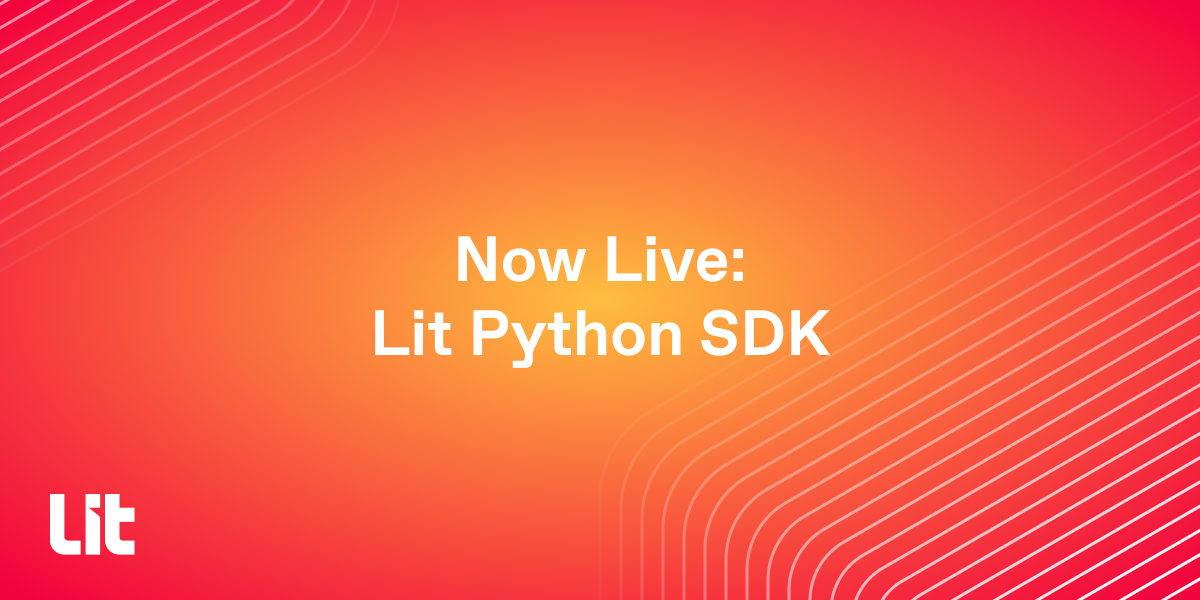Introducing the Lit Python SDK
The Lit Python SDK is now live.

We’re excited to announce that the Lit Python SDK is now live, making it easier than ever for developers to integrate Lit Protocol into their Python-based applications. This new SDK provides streamlined access to Lit’s decentralized encryption, signing, and compute functionality, opening the door for more versatile and secure Web3 applications.
The Python SDK can be accessed here: https://pypi.org/project/lit-python-sdk/
Additionally, a Python adaptation of the Lit Agent Wallet has been released as well. You can access the Python equivalent here: https://pypi.org/project/agentWallet-python/
Supported Functionality
With the release of the Lit Python SDK (lit-python-sdk) and Agent Wallet Python SDK (agentWallet-python), developers can now perform:
- 🔑 Encryption and Decryption: Securely encrypt content with Lit’s key management network and decrypt only when access conditions are met.
- 🔥 Programmable Key Pair (PKP) Generation and Message Signing: Generate Lit PKPs and use them for general message passing and transacting on-chain.
- ⚡ Lit Action Execution: Create and execute Lit Actions for a variety of use cases, such as fetching off-chain data, automating interactions, using dependencies, and more.
- 🤖 Agent Wallet Functionality: Use the Lit Agent Wallet natively in Python.
Getting Started
Getting started is as simple as installing the relevant SDK via pip:
pip install lit-python-sdk
pip install agentWallet-python
Simple Usage Examples
🔹 Perform Encryption and Decryption
# Encrypt a string
encrypt_result = client.encrypt_string(
data_to_encrypt="Hello, World!",
access_control_conditions=access_control_conditions
)
# The encrypt_result contains:
# - ciphertext: the encrypted string
# - dataToEncryptHash: hash of the original data
# Decrypt the string
decrypt_result = client.decrypt_string(
ciphertext=encrypt_result["ciphertext"],
data_to_encrypt_hash=encrypt_result["dataToEncryptHash"],
chain="ethereum",
access_control_conditions=access_control_conditions,
session_sigs=session_sigs
)
🔹 Sign a Message
# Sign a message
to_sign_hex = "0xadb20420bde8cda6771249188817098fca8ccf8eef2120a31e3f64f5812026bf"
hex_str = to_sign_hex[2:] if to_sign_hex.startswith("0x") else to_sign_hex
to_sign = [int(hex_str[i:i+2], 16) for i in range(0, len(hex_str), 2)]
signature = client.pkp_sign(
pub_key=pkp["publicKey"],
to_sign=to_sign,
session_sigs=session_sigs
)
🔹 PKP Generation
# Mint a new PKP
mint_result = client.mint_with_auth(
auth_method={
"authMethodType": 1, # EthWallet
"accessToken": auth_sig_result["authSig"],
},
scopes=[1]
)
pkp = mint_result["pkp"]
🔹 Executing a Lit Action
# Execute the code
js_code = """
(async () => {
console.log("Testing executeJs endpoint");
Lit.Actions.setResponse({response: "Test successful"});
})()
"""
result = client.execute_js(
code=js_code,
js_params={},
session_sigs=session_sigs
)
Looking Ahead
We’re actively working on adding additional functionality to the Python SDK and are focused on making ongoing performance optimizations.
💡 Join the Discussion: Have ideas, feedback, or questions? Join the Lit Builders Circle on Telegram and follow us on X to stay updated on the latest developments.
🚀 Build with Lit today: Check out the following resources to kick off your development journey:
